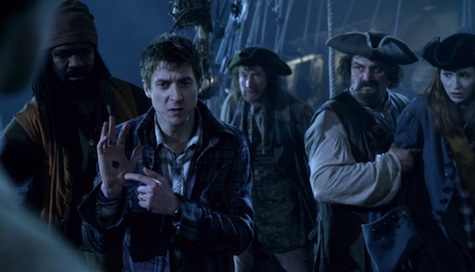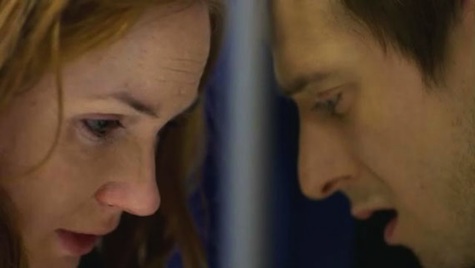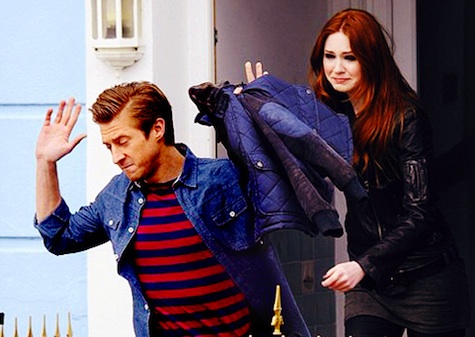Contemporary Doctor Who has been like a relationship for me. It’s charmed me, won me over, tested its boundaries, accompanied me through several changes, let me down and picked me back up again. Since 2006, my memories of what happened in my life are often linked what was going on in Doctor Who at the time. It’s become a bit of personal clock, with each big plot reveal, finale, premiere or regeneration burned into my mind like the Time War is burned into the Doctor’s.
But, you know what? Some relationships have to come to an end, usually because one party isn’t getting what they want. This show hasn’t been giving me what I want for a while now and, sadly I’m probably going to have to break up with Doctor Who.
The Spark is Gone and We’re Just Going Through the Motions
We’ve all experienced that moment in a relationship, when the other person is doing the same things they’ve been doing since you met them, but now, it’s just not cute anymore. And for me, the things Doctor Who is doing now maybe aren’t that different than years ago. It’s just that back then I think it was behaving better and was more charming. Also, I was a little younger.
But, it’s not just that I’ve grown older; I’d assert Doctor Who is in a phase of diminishing returns insofar as the episodes are increasingly imitative of previous episodes. If you go back and look at the episode listings for previous new-era Doctor Who season, every single “just okay” episode of this season has a counterpart in a previous season that is way better. The best example would be the recent “Cold War” versus “Curse of the Black Spot.”

Now, I dislike both of these episodes, but at least “Curse of the Black Spot” has pirates, a quirky sci-fi concept, and a lot of charm. “Cold War” has none of this. Indeed, having Clara and the Doctor be from the future/outer space has zero bearing on them being in 1983. There’s no fun time paradox stuff explored, and essentially the Doctor could have been any smartass with a magic wand in this episode. Despite the presence of a nuclear weapon, the stakes of “Cold War” are impossibly low.
We can do this again with “The Power of Three” versus, say, another Earth-bound-fix-the-alien-conspiracy episode like Season 4’s “Partners in Crime.” The former has a generic alien and little bit of charm. The latter has an awesome weird alien in the form of human fat turning into creatures, and tons more charm thanks to Donna Noble and the Tenth Doctor. This can go on and on: “The Rings of Akhaten,” while decent, is totally a poor man’s “The Beast Below.” “Asylum of the Daleks” is the poor man’s “Victory of the Daleks.” The point? Doctor Who is totally just going through the motions. And despite my unabashed love for “Closing Time” in season 6, it is still the faux version of season 5’s the “The Lodger.” And don’t get me started on the Weeping Angels.
Okay, get me started. The Weeping Angels are the best example of the love leaking out of Doctor Who. Each subsequent appearance of these creepy time-shifting statues renders them more confusing and less scary than the previous outing, culminating in the nearly-impossible-to-follow “The Angels Take Manhattan.” Back in “Blink,” the Angels were new and fresh, but now they are a total mess; the mechanics of how they operate have become overly convoluted, thus making them completely dull. And I’d assert this is because…well, we got to know them better. To put a relationship metaphor inside of a relationship metaphor: the Weeping Angels should have been a one-time fling, making Doctor Who’s attempt to actually date them a big mistake.
Broken Promises
Relationships also end because of broken promises. And though there were a few broken promises prior to the Matt Smith/Steven Moffat era, I’d say the real trouble started with the River Song/Silence arc in season 6. All season we waited to discover the mysteries of River Song, her connection to the Silence, and why they put her in an astronaut suit. In the end, the explanation was just that they stuck her in the suit because “it was time to.” And the way the good guys got out of it? River Song “re-wrote time” because she and the Doctor touched each other when they weren’t supposed to. And then a wacky alternate time-stopped world evaporated. Essentially, this episode continued an early precedent of having a complicated problem be solved on the show by either re-writing time or rebooting the entire universe. In conventional fiction, this would be like having a regular novel suddenly become a choose-your-own-adventure book in its last chapters, randomly telling the reader, “hey you can start over.”
Notably, both season five and season six end with a wacky aborted universe and a wedding. If there’s not a wedding and a wacky alternate universe at the end of season seven, I’ll be worried Stefan Moffat forgot to rip himself off. Now, I’m not saying Doctor Who should be a champion of stories that make sense all the time, but it should at least be consistent with its own mythology. The excellent Tennant/Davies era episode “The Waters of Mars” showed us the huge consequences (mostly emotional) when you screw with fixed points in time. These days that doesn’t mean jack shit, because the Doctor seems down with rewriting time whenever it suits the needs of the script.
This season we’re being presented with two-season spanning “mysteries” which will be “answered,” at some point, probably in the finale episode. One: what’s the deal with Clara? Two: What is the Doctor’s name, and should we care? And maybe because I’m so weary from the River Song stuff, I feel like the promise of these questions being answered adequately will be broken.
Many of us have been complaining that Clara reminds us of previous companions. Is she like Rose? Or is the whole mystery thing more like River Song? But then again, we’ve got some Amy Pond action too, since the Doctor has visited Clara as a child. In the end though, it doesn’t matter how funny or fast-talking Clara is, she doesn’t seem that different from characters we’ve seen before. Add to that, I feel like any explanation of how she manages to die and come back to life all the time will be a bit of a letdown, buried underneath a pile of hastily-written nonsense. It would be nice to lay all this blame at the feet Steven Moffat’s reset-button tendencies, but Russell T. Davies had his fair share of deus ex machina shenanigans on Doctor Who. And I’m not alone on these last-minute fixes being annoying, back in 2010 author Terry Pratchett wrote:
The unexpected, unadvertised solution which kisses it all better is known as a deus ex machina—literally, a god from the machine. And a god from the machine is what the Doctor now is. A decent detective story provides you with enough tantalising information to allow you to make a stab at a solution before the famous detective struts his stuff in the library. Doctor Who replaces this with speed, fast talking, and what appears to be that wonderful element ‘makeitupasyougalongeum.’
Pratchett ended up letting Doctor Who off the proverbial space hook with his piece however, by declaring it “pure professionally-written entertainment,” and in 2010, I would have agreed with him. But, at this point, the deus ex machina are feeling less like a quirk of the Doctor and more like a deep-rooted personality flaw. I can already hear fans telling me that the show is just “fun,” and I shouldn’t expect much from it, but in the mind of a critic, that’s a fairly reductive attitude that can lead to a slippery slope of everything being excused away as “just entertainment.”

So when was the last time Doctor Who was truly great? I’d assert the fantastic season 6 episode “The Girl Who Waited” reminded me of why I fell in love with the show in the first place. In that one, the Doctor screws up, and Amy Pond is stranded in a weird time stream where decades pass for her, while no time passed for Rory and the Doctor. The dilemma of choosing between the young Amy and the old Amy is an awesome science fiction conceit and created great character conflict worthy of any TV show, film, or work of fiction. This story didn’t concern itself with a larger season-long arc, nor did it require weird knowledge of Doctor Who mythology. Heroically, instead of meditating too long on the paradox of old Amy and new Amy living on the TARDIS together, that notion is turned into an awesome one-liner. Rory asks “Can it work, Doctor?” to which the Doctor replies, “I don’t know, it’s your marriage.”
Here, a character has to make a choice and their choice impacts what happens to the other characters. There are emotional stakes set up by a beautiful and interesting premise, which feels unique to the world of Doctor Who in general. Like “Father’s Day,” “The Girl in the Fireplace,” “Human Nature,” “The Fires of Pompeii,” “The Waters of Mars,” “Vampires of Venice,” “The Lodger,” and other great Doctor Who episodes, real character drama collides with science fiction to create unique television.
But since “The Girl Who Waited,” I’ve been waiting for Doctor Who to return to its greatness and remind me why I supposedly love it. And though it still flirts with me and makes me laugh, I feel like the magic has gone out of our romance and it might be time to stop. Too many broken promises, Doctor Who! You need to win me over again!
It would be sad, to break up with Doctor Who because, truly… I don’t want to go!
Ryan Britt is a writer for Tor.com and is very sorry to have this talk with Doctor Who, but Doctor Who has left him no choice.










